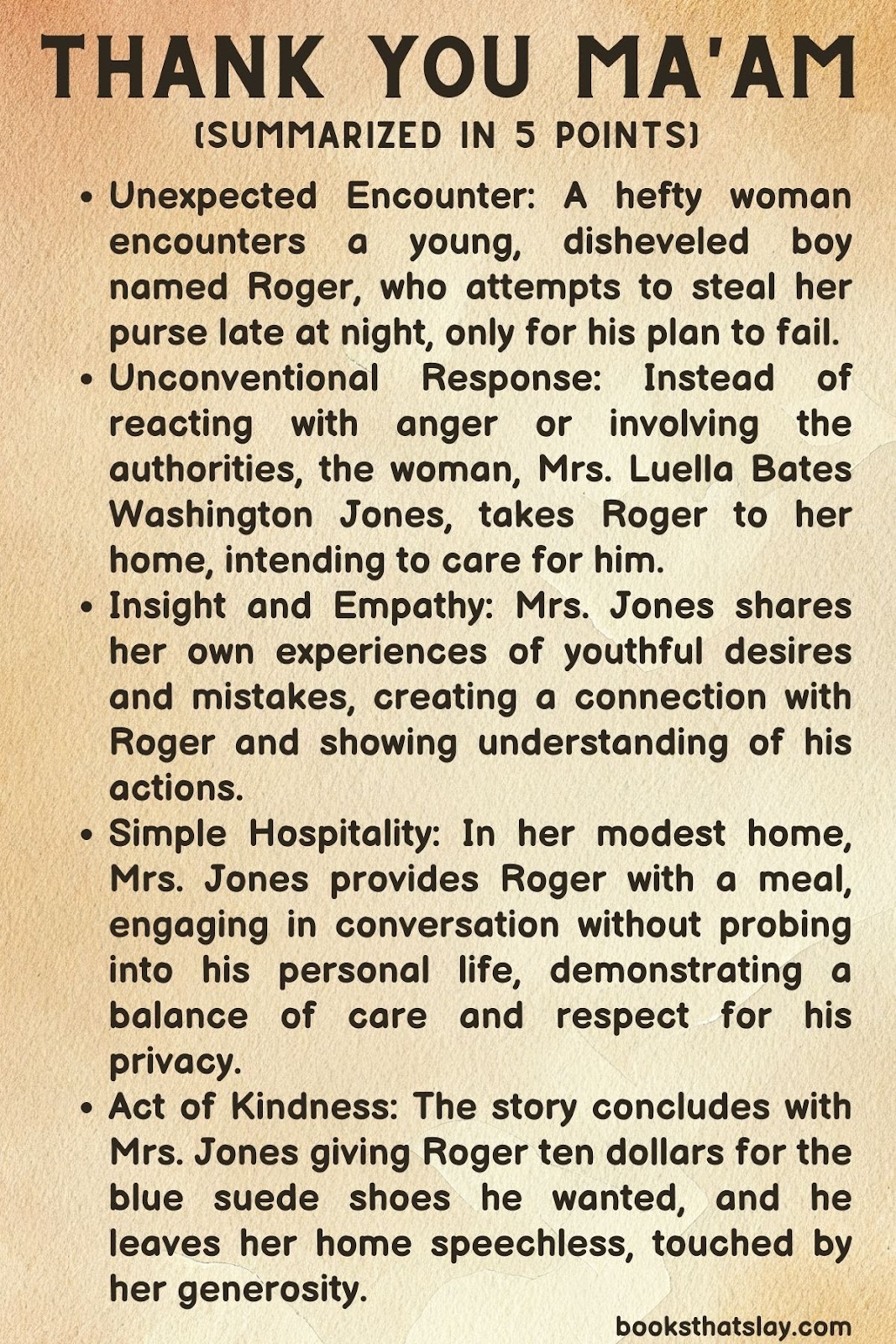Thank You Ma’am Summary, Characters and Themes
“Thank You, M’am,” a captivating short story by the renowned Harlem Renaissance author Langston Hughes, is not a novel but rather a brief yet impactful narrative that delves into themes of empathy, understanding, and the unexpected connections that can arise between strangers.
Set in an urban backdrop that Hughes vividly brings to life with his masterful storytelling, this story unfolds over the course of a single, transformative evening.
Full Summary
In the dead of night, beneath the glow of dim streetlights, a hefty, unnamed woman trudges along, her purse heavy in her grasp. Suddenly, a young, disheveled boy, desperate and unkempt, dashes up in a misguided attempt to snatch her bag. His plan derails spectacularly when the strap of the purse snaps, causing him to tumble onto the sidewalk in a heap.
Undeterred, the woman, with a mix of sternness and unexpected compassion, hoists the boy—now revealed as Roger—up by his shirt. Despite his fear and desire to flee, she insists on taking him back to her home, a place that Roger soon discerns must be a bustling boarding house.
There, in the modest warmth of her dwelling, Mrs. Luella Bates Washington Jones, as she introduces herself, confronts Roger not with anger, but with an almost maternal firmness.
She releases her grip, yet her presence alone is enough to keep Roger from bolting out the door he briefly considers escaping through. Instead, he finds himself obeying her command to wash up, his mind swirling with questions about whether she intends to hand him over to the authorities.
However, Mrs. Jones has other plans. She suggests that hunger might have fueled Roger’s actions, a theory he quickly dismisses. His true motive, he confesses, was a yearning for a pair of blue suede shoes.
This revelation doesn’t earn him scorn but rather a moment of shared vulnerability. Mrs. Jones confides in him, speaking of her own youthful desires and mistakes, creating a bridge of understanding between them.
The evening unfolds in a simple yet profound manner. Mrs. Jones, without prying into Roger’s life or lecturing him, prepares a humble but nourishing meal.
As they eat, she shares snippets of her life, mentioning her job at a hotel beauty shop, but carefully sidestepping any interrogation of Roger’s personal circumstances.
Their unexpected connection comes to a close as abruptly as it began. In a final act of generosity, Mrs. Jones hands Roger ten dollars—enough for those coveted shoes—and sends him back into the night.
Roger, overwhelmed and unable to utter a word of thanks, watches as she closes her door, leaving him alone with a newfound sense of gratitude and the memory of an evening that would forever change his perspective.
Characters
Roger
Roger, a skinny, nervous teenager, embodies the struggles of a life marked by poverty and neglect. His initial timidity and low self-esteem reflect his challenging background.
However, his encounter with Mrs. Jones sparks a notable transformation in him. As she treats him with respect and trust, Roger begins to see himself differently, striving to be trustworthy and responsible.
The story captures his journey from a mistrustful, desperate youth to someone who gains a sense of self-worth and respect for others.
Mrs. Luella Bates Washington Jones
Mrs. Jones is a strong, no-nonsense woman whose initial tough demeanor masks a deeply caring and maternal nature.
She skillfully handles Roger’s attempted theft with a mix of sternness and empathy, understanding the deeper issues behind his actions.
Her approach shifts from disciplinarian to nurturing, treating Roger with respect and kindness.
This culminates in her generous act of giving Roger money for the shoes he wanted, exemplifying her belief in the redemptive power of kindness and the positive impact of treating someone with dignity and understanding.

Themes
1. Compassion and Understanding in the Face of Adversity
The story is a striking illustration of how empathy can transform a potentially negative situation into a moment of connection and understanding.
Mrs. Luella Bates Washington Jones, instead of reacting with anger or fear to the attempted theft, chooses to see the boy behind the act.
Her decision to take Roger home, feed him, and share her own stories, reflects a deep understanding that people, especially the young, sometimes make poor choices not out of malice, but due to unmet needs or unfulfilled desires.
This theme underscores the power of compassion in changing hearts and redirecting lives.
2. The Impact of Kindness and Generosity
Hughes beautifully explores the ripple effect of kindness.
The unexpected generosity Mrs. Jones shows towards Roger is not just in the material help she offers but in the dignity and respect she accords him. She listens to him without judgment and shares her own vulnerabilities, making her kindness not just an act of charity, but a gift of human connection.
This theme highlights how acts of kindness, big or small, can leave a lasting impact on individuals, shaping their attitudes and potentially their future actions.
3. Moral and Ethical Lessons Through Personal Experience
The narrative is a powerful vehicle for conveying moral lessons without being preachy.
Through the interaction between Mrs. Jones and Roger, Hughes subtly imparts lessons about responsibility, trust, and making the right choices.
Mrs. Jones does not lecture Roger; instead, she leads by example, showing him trust by leaving him alone in her purse, and guiding him towards understanding why his actions were wrong.
This theme suggests that personal experiences, especially those involving direct interaction and empathy, can be more effective in teaching moral lessons than direct admonition.
Final Thoughts
This narrative beautifully illustrates the power of empathy and kindness in transforming a potentially negative situation. Mrs. Jones’ decision to treat Roger with compassion and understanding, rather than punishment, highlights the impact of nurturing connections over enforcing discipline.
The story subtly emphasizes the idea that everyone, regardless of their circumstances, deserves kindness and a chance for redemption.
It’s a poignant reminder that sometimes the most profound lessons come from the most unexpected encounters.